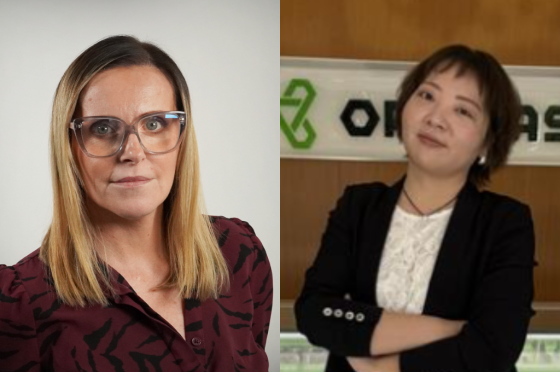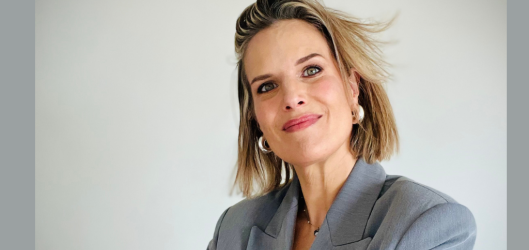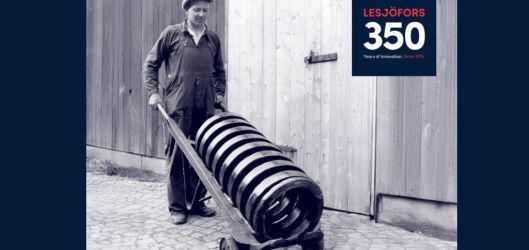
With decades of experience in the fastener industry and across different continents working for Optimas Solutions, Jocelyn Zhou (pictured right), Sales Manager working out of Suzhou, China; Nicola Small (pictured left), Commercial Director for the UK based in Gloucester; and Patricia Lebreton, Outside Sales Program Manager stationed in Hambach, France, share their insights into the fastener industry - and wider engineering sector - with us.
How did you get into the industry?
Lebreton: I needed to complete an internship during the final year of my master's degree, and I was fortunate enough to do it with this company. At the end of the internship, they offered me a work contract, which I gladly accepted.
Small: My entry into the industry started with a summer job in the UK after finishing my exams at age 16. I had family working at a malethreaded manufacturing facility, and they needed temporary support as they worked toward gaining TS 9000 accreditation. I was brought in to help with the administrative side - mainly compiling documents and supporting the implementation process.
The original plan was to return to higher education, but the appeal of earning a regular salary convinced me to stay. While I was still working as a temp, a vacancy came up in the production planning department. I applied, got the job and ended up staying in that role until the site eventually closed in the early 2000s.
Zhou: My story is pretty straightforward - I'm still in my first career so far. I started as a graduate trainee back in 2011, right after finishing my master's degree. I actually found out about the job through a recruitment message on my university's website.
What really caught my attention was that the company was offering a full-year training programme in the UK.
That opportunity to spend a whole year in the UK, fully paid by the company, was a huge attraction for me. Moreover, I would be able to start my career in a role I was excited about. It felt like a dream job at that moment, so I applied, passed the interview, and got the position as a graduate trainee. And here I am, 14 years later!
What does your day-to-day job involve?
Lebreton: I respond to all my customers' price requests, ensuring they get accurate and timely information. I also support them with the engineering side of part development- often by identifying and offering components we already have in stock that might suit their needs. In addition to that, I closely follow up on ongoing projects by tracking the offers we've already sent and verifying consumption figures to ensure everything is progressing smoothly. Another important aspect of my role is prospecting, which means identifying and reaching out to potential new clients.
Small: I lead a team that manages the entire front-end process of our business. We handle everything from receiving customer requests to product implementation, including product approval by our quality teams. Like Jocelyn, I maintain relationships with customers and support our sales teams with bidding and negotiations on new inquiries. I also work closely with our vendors, so I'm positioned right in the middle, managing relationships on both sides. This makes my day-to- day work very varied, which is something I really enjoy.
Zhou: In my current role, I'm both a team leader and an individual contributor. My daily responsibilities involve looking after my team members, providing them with guidance and support to help them succeed. At the same time, I manage relationships with my clients to ensure their needs are met. A big part of my day is spent handling requests for quotations (RFQs), following up on customer projects and making sure I deliver a high level of service that satisfies my clients.
What are the biggest changes you have seen in the industry and company since you started?
Lebreton: Customers are no longer keen on face-to-face meetings as digital communication has taken over. There's also been a noticeable drop in product knowledge among customers, which means we now have to spend more time educating and guiding them. Another significant shift is the increased level of support required for newcomers - there's a bigger learning curve now, and we need to provide much more hands-on guidance to help them get up to speed.
Small: I think one of the biggest changes has been how much smaller the world feels now - especially after Covid. Communication has evolved massively. We can now speak to people across continents and time zones in real time, which wasn't possible before. When I started, we were still using fax machines as the world of work hadn't started using the internet. You'd fax someone and wait. Now everything happens so much faster, which has completely changed how we work.
Another big change is the increasing presence of women in the fastener industry, particularly in leadership roles. When I started in 1997, there were women in the industry, but mainly in administrative or support roles - you didn't often see them in management. That's really changed across many countries and now we're seeing more women stepping into leadership positions, which is great to see.
Zhou: Since I'm in China, I've witnessed significant changes over the past 15 years, especially influenced by geopolitical issues. When I began my career, the world felt much smaller due to globalisation - countries were closely connected and communication was almost instant.
However, in the last three or four years, this trend has shifted, and the world seems to be expanding again as geopolitical tensions have grown. These issues now play a major role in the global economy and have directly impacted our business. For example, in the last couple of months, our China team has been dealing with the effects of tariffs (imposed by the US government), and I know the US tariffs have also affected our teams there. This shift in the geopolitical landscape is the biggest change I've seen since I started.
Can you share some of your career highlights and milestones so far?
Lebreton: One of the biggest milestones was entering the automotive industry as a woman back in the 1990s, a space that was very much dominated by men at the time. I had to work twice as hard to earn respect and prove myself, and there was absolutely no room for error. Today, I work in a much more balanced environment with as many women as men, which is a real sign of progress.
Small: Looking back, one of my early highlights was stepping into a leadership role at my first company. It was a very male-dominated leadership team, and at times I was the only woman in that decision-making group. In hindsight, that was quite an achievement. More broadly, I'd say my greatest accomplishment has been the ability to continue progressing my career - especially here at Optimas - while also raising my family. There's no single standout milestone, but being able to grow professionally, keep learning and balance that with family life is something I'm genuinely proud of. We work to live, not live to work and I feel fortunate to have managed both.
Zhou: The highlights of my career have evolved over time. In the past, being the top salesperson at Optimas Suzhou was a major milestone for me. It showed that I could make a real contribution to the company and grow alongside it. More recently, as a sales manager, I find great satisfaction in helping my team members hit their KPIs, set clear goals and achieve them. Supporting their growth feels like one of my biggest accomplishments.
Another significant milestone has been helping to establish a new legal entity in Singapore. This came as a response to growing demand from our semiconductor customers, and it's rewarding to see how my efforts have contributed to organisational growth and strategy.
What is your favourite thing about the fastener industry?
Lebreton: I love the variety of products and the technical complexity involved. There's always something new to learn and every project can present a fresh challenge, which keeps things interesting.
Small: For me, it's the constant evolution. A fastener today isn't the same as one created 20 or 30 years ago. We're always seeing new technologies, automation and coatings emerge. There's always something new to learn.
You never reach a point where you know everything, and that's what makes it so exciting. There's always room to grow and to share that knowledge with others. Especially at Optimas, where we deal with such a wide range of fasteners, the variety keeps things interesting. Even after so many years in the industry, there's still so much more to discover.
Zhou: What I enjoy most is the opportunity to face challenges. I like finding different ways to overcome them. Just like our company's name, Optimas Solutions, we focus on providing effective solutions, both for our customers and internally. Being able to tackle challenges and deliver strong results is the part I find most rewarding in the fastener industry.
What do you think needs to be done to encourage more women to get involved in the fastener industry?
Lebreton: Honestly, the sector has already evolved a lot since I first started. Today, women entering the industry receive strong technical support and there's much more emphasis on sharing product knowledge and training. For example, I make sure to explain to my team exactly where a part goes and which car it's for - having that context really helps build confidence and understanding. Continuing to provide this kind of support will go a long way in encouraging more women to join and thrive in the industry.
Small: I think the issue goes beyond fasteners. It's the engineering industry as a whole, where the percentage of women is still far lower than men, especially in the UK. If we want to see more women in fasteners and engineering in general, it really needs to start with education. We have to begin those conversations in secondary schools, colleges and universities. I'm not sure how we make it more appealing, but it could be presented as more engaging and fun. That's the challenge. Initiatives like highlighting women in fasteners, sharing case studies and real-life examples are definitely part of the solution. Getting those stories out to young people in education can really help shift perceptions and spark Interest.
Zhou: Be brave and open-minded. Don't lean on the fact that you're a woman - your gender shouldn't define your path. At the same time, be honest with yourself and with the world.
If you could, what piece of advice would you give your younger self as you started working in the fastener industry?
Lebreton: Without a doubt, I'd tell myself to work even harder on my English!
Small: I've always believed in the power of asking questions, and even now, that's something I still live by. If I could give advice to my younger self, it would be: ask even more questions. I probably asked some back then, but not nearly enough. Keep asking questions, no matter how small they may seem. Mistakes aren't a problem unless you fail to learn from them. Take feedback on board, accept the criticism and use it to grow. That's how you develop. So yes, ask questions and never stop asking them.
Zhou: Don't be afraid of making mistakes. What you should fear is not learning anything from them. Every mistake can teach you something valuable. Those lessons will help you grow and progress. Accept that and keep moving forward. I would also tell my younger self to be more open-minded.
Ten years ago, when I started my career, I focused only on the customer and on the small details, without considering the bigger picture or the external factors that also play a role. Over time. I've learned that everything is connected. So, stay open to the wider world, not just the immediate tasks in front of you.
Any final thoughts?
Lebreton: I've been in the fastening business for nearly 40 years, and I've truly enjoyed the ride. It's been a great career - I can't imagine myself ever selling women-specific products like tights or makeup! This industry suits me perfectly, and I'm proud of the path I've taken.
Small: For me, it all comes back to people and how we can attract more into the fastener industry. I'd say: be open-minded. At first glance, it might not seem like the most exciting sector, but there are constant technical and technological developments that keep things interesting. Also, never stop learning. Always stay curious and open to new knowledge. And most importantly, never be arrogant enough to think you know it all. There's always more to discover.
Zhou: My advice would be similar: don't lose your passion and curiosity for your career. Keep looking beyond your immediate surroundings and always keep learning. That's a big part of staying engaged and growing. Take charge of your own path. because there's a whole world out there waiting for you.


